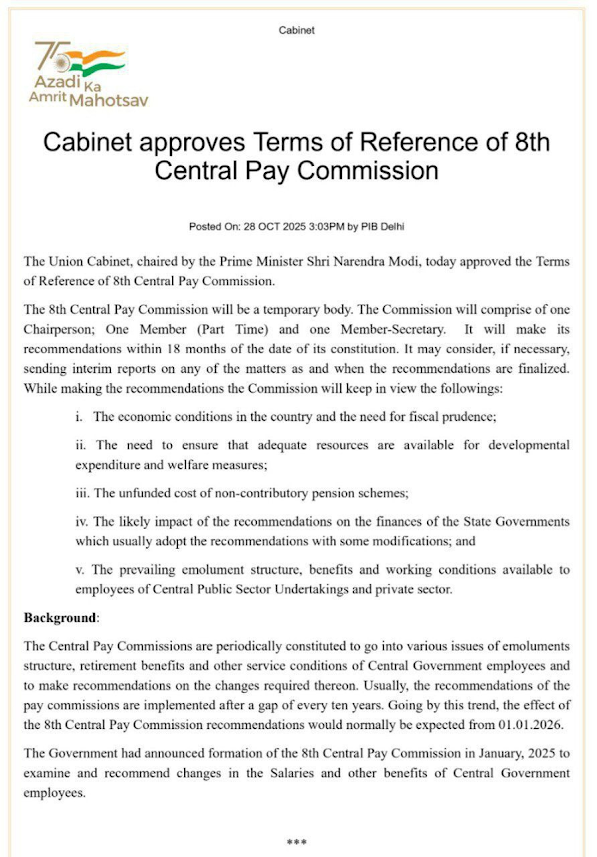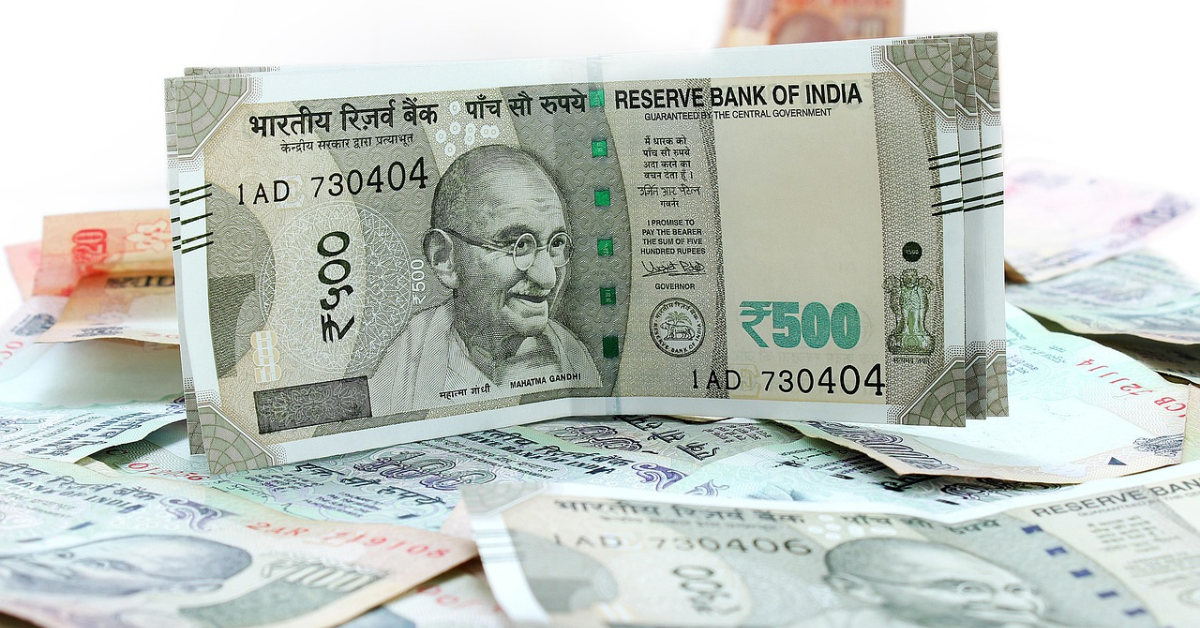The Union Cabinet has officially approved the Terms of Reference (ToR) for the 8th Central Pay Commission (8th CPC), marking a major development for Central Government employees and pensioners across India. Once implemented, the 8th Pay Commission salary hike will benefit around 50 lakh employees and 69 lakh pensioners, with the new pay structure likely to take effect from January 1, 2026.
What Is the 8th Pay Commission?
A Pay Commission is a government-appointed panel that reviews and revises the salaries, allowances, and pensions of Central Government employees to align with economic growth and inflation.
The 7th Pay Commission, which came into force in 2016, had increased the minimum basic pay from ₹7,000 to ₹18,000. Following this timeline, the 8th Pay Commission applicable date is expected to be January 1, 2026.
The government has already started consultations with key ministries including Finance, Home Affairs, and DoPT to finalize the framework and timeline for implementation.
8th Pay Commission Terms of Reference (ToR)
As per the latest 8th Pay Commission news, the Cabinet has approved the official Terms of Reference (ToR), which outline the key responsibilities of the panel.
- The 8th Pay Commission Committee will review the pay structure of Central Government employees, ensuring balance between fiscal responsibility and employee welfare.
- It will consider the financial impact on both Central and State Governments.
- The panel may also submit an interim report before the final recommendations.
- The Commission will have 18 months to submit its report from the date of constitution.
The Commission will be chaired by Justice (Retd.) Ranjana Prakash Desai, with one part-time member and one member-secretary.

8th Pay Commission Salary Hike and Fitment Factor
One of the most awaited updates is the 8th Pay Commission salary hike. Though the government hasn’t yet released the new pay matrix, experts project a fitment factor of 2.86, which could result in a 30-40% increase in basic pay for most Central Government employees.
- A Group C employee earning ₹18,000 basic pay may see it rise to ₹25,000–₹28,000.
- A mid-level officer earning ₹1 lakh/month could see a rise to ₹1.14–₹1.18 lakh depending on budget allocation.
- Senior officers could witness a total salary increase of up to 50%.
If implemented as projected, the minimum basic salary may increase from ₹18,000 to ₹46,260, while the minimum pension could rise from ₹9,000 to ₹23,130.
8th Pay Commission Fitment Calculator: How to Estimate Your New Salary
The fitment factor determines how much salaries and pensions are multiplied under the new pay structure. For example, under the 7th CPC, the factor was 2.57. A rise to 2.86 in the 8th Pay Commission could significantly boost take-home pay. Employees can use an 8th Pay Commission fitment calculator or salary calculator online to estimate their revised pay and allowances.
8th Pay Commission Not Applicable to Bank Employees
The 8th Pay Commission will not be applicable to bank employees. The Pay Commission applies only to Central Government employees working in departments, ministries, and autonomous bodies funded by the Centre. When implemented, all Central Government employees will receive a salary hike, and the pension of retired Central employees will also increase. However, public sector bank employees, including those in SBI, PNB, Canara Bank, and other government-owned banks, are not covered under the Pay Commission.
Expected Allowances and Benefits
Along with salary revisions, the 8th Pay Commission is likely to recommend increases in several key allowances. These revisions will ensure that employees maintain their purchasing power amid rising costs of living.
- Dearness Allowance (DA): Linked to inflation, DA will continue to rise periodically.
- House Rent Allowance (HRA): Expected to increase, especially for employees living in metro cities.
- Travel Allowance (TA): Will be revised upward, helping employees manage travel and official duties.
Pension and Retirement Benefits
The 8th Pay Commission will also focus on improving pension and post-retirement benefits.
Retirees under the Old Pension Scheme (OPS) may get enhanced monthly pensions, while those under the New Pension System (NPS) could see higher government contributions or improved withdrawal options. This ensures long-term financial stability and security for retired employees.
How Central Government Employees Can Prepare?
Here are some practical steps for employees to stay ready:
- Track official updates from the Department of Expenditure and Department of Financial Services.
- Use the 8th Pay Commission fitment calculator to forecast your revised pay.
- Adjust your financial plans based on the expected salary hike and pension benefits.
- Keep records of your pay structure and DA/HRA components for accurate recalculations.
FAQs
Q1: When will the 8th Pay Commission be implemented?
A1: The 8th Pay Commission applicable date is expected to be January 1, 2026. The Commission will be officially formed by April 2025, and it will have 18 months to submit its recommendations. Implementation is expected between 2026 and 2027, depending on the government’s approval process and budget allocations.
Q2: What is the expected salary hike under the 8th Pay Commission?
A2: While official pay scales are yet to be announced, experts estimate a fitment factor of around 2.86, leading to a 30%–40% increase in basic pay for Central Government employees. On average, salaries could rise by up to ₹19,000 per month, depending on position and grade.
Q3: Will the 8th Pay Commission be applicable to bank employees?
A3: No. The 8th Pay Commission will not be applicable to bank employees. As per ClearTax, the Pay Commission covers only Central Government employees. Salaries of public sector bank employees are revised through bipartite wage settlements between the Indian Banks’ Association (IBA) and bank unions, not under the Central Pay Commission.
Q4: Who will benefit from the 8th Pay Commission?
A4: Around 50 lakh serving Central Government employees and 69 lakh pensioners will benefit from the 8th Pay Commission. This includes staff from all ministries, departments, and autonomous bodies under the Central Government. Pensioners will also receive higher pension payouts once the new structure is implemented.
Q5: What allowances are likely to change under the 8th Pay Commission?
A5: The Dearness Allowance (DA), House Rent Allowance (HRA), and Travel Allowance (TA) are expected to be revised. These increases will help employees manage rising living costs and improve their overall financial well-being.
- OICL AO Admit Card 2026 Out, Download Mains Call Letter
- RBI Assistant vs LIC Assistant: A Brief Comparison
- Success Story of Himanshu Garg: Cleared RBI Assistant
- RBI Assistant Prelims Study Plan 2026: 50-Day Strategy Guide
- Nainital Bank PO Final Result 2025-26 Out, Check Download Link
- IBPS PO & SO Provisional Allotment List 2025-26 Out, Check Your Bank
Hi, I’m Tripti, a senior content writer at Oliveboard, where I manage blog content along with community engagement across platforms like Telegram and WhatsApp. With 3+ years of experience in content and SEO optimization related to banking exams, I have led content for popular exams like SSC, banking, railway, and state exams.
